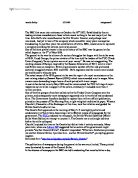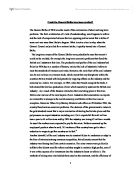One of the most pivotal events in the early history of the BBC was the general strike which began on the 3rd of May 1926.
Amelia Bailey 25/10/05 Assignment/1
The BBC first came into existence on October the 18th 1922. Established by the six leading wireless manufacturers these initials meant nothing to the vast majority at this time. John Reith who would become the first Director General, and perhaps most renowned, had yet to hear of the company which would for many years monopolise broadcasting. In just four years the combination of letters, BBC, would come to represent a company providing the nations main news source.
One of the most pivotal events in the early history of the BBC was the general strike which began on the 3rd of May 1926.
The general strike was the climax of a series of struggles that began with the strike wave of 1919. Lloyd George, the prime minister of the time told the leaders of the TUC (Trade Union Congress), 'In our opinion we are at your mercy'.1 He was not exaggerating. The working classes of Europe, inspired by the Russian Revolution of 1917, were in revolt and Britain was no exception. Britain experienced a number of bitter and protracted sectional struggles between 1921 and 1922 . Both engineers and the miners were locked out and forced to take pay cuts.
The actual cause of the 1926 general strike was the report of a royal commission on the coal-mining industry (Samuel Report (1926)) which recommended a cut in wages. Mine owners were demanding longer hours of work paired with lower wages.
A coal strike started in early May 1926 and the miners asked the TUC to bring all major industries out on strike in support of the action; eventually it included more than 2 million workers.
One of the first groups of workers called out by the Trades Union Congress were the printers, and consequently most ...
This is a preview of the whole essay
The actual cause of the 1926 general strike was the report of a royal commission on the coal-mining industry (Samuel Report (1926)) which recommended a cut in wages. Mine owners were demanding longer hours of work paired with lower wages.
A coal strike started in early May 1926 and the miners asked the TUC to bring all major industries out on strike in support of the action; eventually it included more than 2 million workers.
One of the first groups of workers called out by the Trades Union Congress were the printers, and consequently most newspapers appeared only in very brief and condensed form. The Government therefore decided to replace them with an official publication, printed on the presses of The Morning Post, a right-wing but traditionalist paper. Winston Churchill, Chancellor of the Exchequer at this time, took the initiative and guided the British Gazette's editorial line.
The Gazette first appeared on the morning of May 5. It was highly patriotic and condemnatory of the strikers, becoming a very effective means of propaganda for the government. The TUC produced its own paper, the British Worker (subtitled Official Strike News Edition) to attempt to counter it. The Gazette ran to only eight editions before the strike collapsed.
Churchill enjoyed his time on the Gazette but did not take it entirely seriously. Many years later, when one Labour MP suggested that an action of his government might provoke "another General Strike", Churchill responded: "If the hon. Gentleman promises me another General Strike, I promise him - another British Gazette!", prompting general laughter.
Retrieved from "http://en.wikipedia.org/wiki/British_Gazette"
The publication of newspapers during the general strike was very limited. Those printed were dominated by news of the General Strike.
In the absence of newspapers the BBC started broadcasting five news bulletins a day.
The Conservative government under Stanley Baldwin used troops, volunteers, and special constables to maintain food supplies and essential services, and had a monopoly on the information services, including BBC radio. After nine days the TUC ended the general strike, leaving the miners - who felt betrayed by the TUC - to remain on strike, unsuccessfully, until November 1926. The Trades Disputes Act of 1927 made general strikes illegal.
The miners continued to strike but returned to work in August, accepting lower wages and longer hours. Trade union membership declined after the strike. Nevertheless, it provided the excuse for retaliatory measures against trades unions and led to the passage of the 1927 Trade Disputes Act, which restricted the ability of workers to strike.
The National Strike began on 3 May. The strikers' newspaper published by the TUC, 'The British Worker', was at great pains to argue that workers 'must not be misled by Mr. Baldwin's attempt to represent the present struggle as a political one'. Workers on the 'Daily Mail' refused to print a leading article denouncing the strike under the banner headline 'For King and Country'. Negotiations continued, including secret talks between the TUC Negotiating Committee and Herbert Samuel, chair of the 1925 Royal Commission. These resulted in the Samuel Memorandum - the so-called formula which was used to end the strike.
The strike received overwhelming support, despite the carefully laid plans of the OMS. This success was due in large measure to the work of Trades Councils and Councils of Action. All such activities were accomplished in the teeth of police harassment and mass arrests, with the armed forces strategically positioned close to suspected 'trouble spots'.
However, much to the surprise of the participants, and to the shock of the miners, the acceptance by the TUC of the Samuel Memorandum was used as the formula for a 'settlement' and the strike was called off after 9 days. In fact, the Memorandum settled nothing. It was merely a re-jigging of the proposals of the 1925 Royal Commission with the difference that the Memorandum made vague the former's more explicit demands for wage reductions.
: T Cliff and D Gluckstein, Marxism and Trade Union Struggle: the General Strike of 1926 (Bookmarks, 1986), p84







